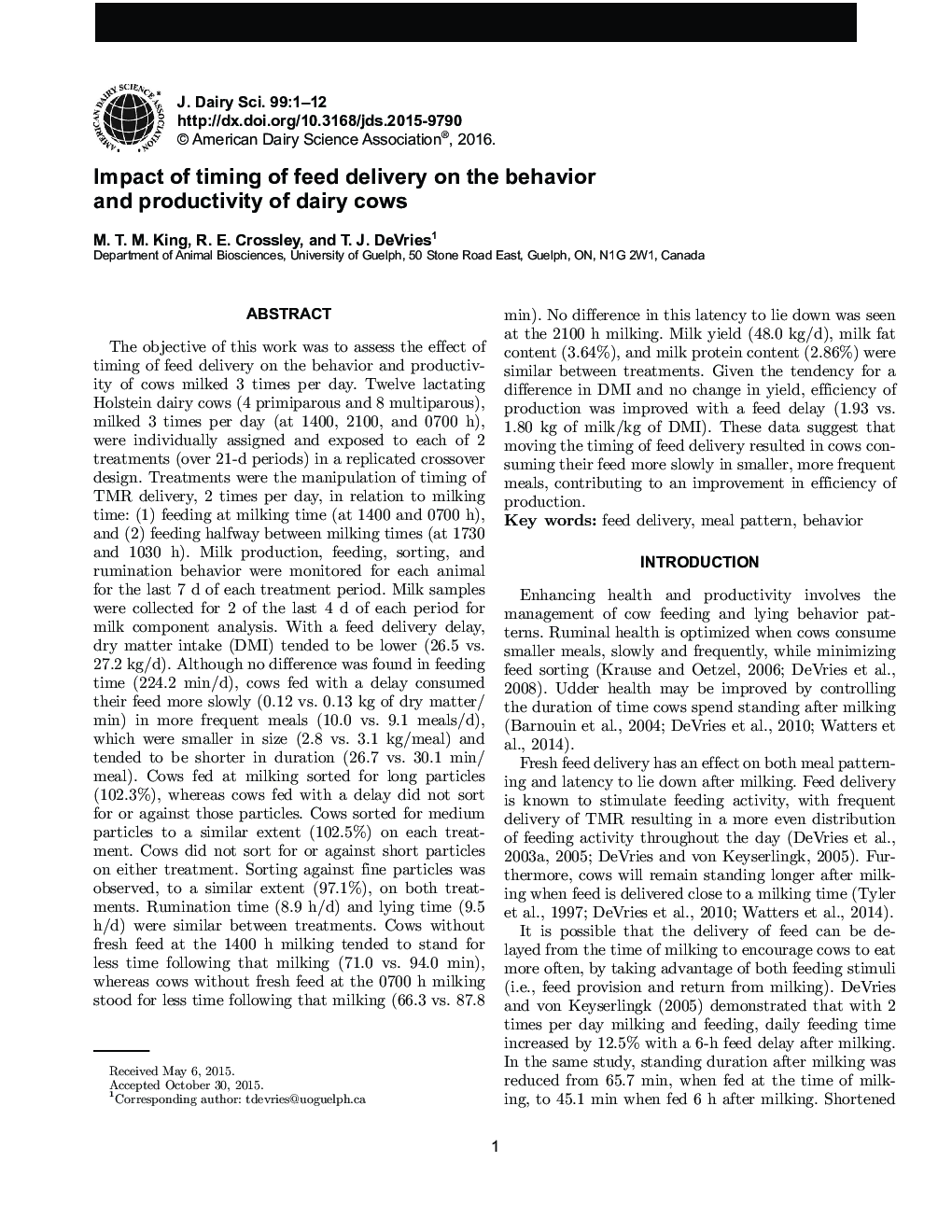| کد مقاله | کد نشریه | سال انتشار | مقاله انگلیسی | نسخه تمام متن |
|---|---|---|---|---|
| 10973578 | 1108016 | 2016 | 12 صفحه PDF | دانلود رایگان |
عنوان انگلیسی مقاله ISI
Impact of timing of feed delivery on the behavior and productivity of dairy cows
ترجمه فارسی عنوان
تأثیر زمان تحویل غذا بر رفتار و بهره وری گاوهای شیری
دانلود مقاله + سفارش ترجمه
دانلود مقاله ISI انگلیسی
رایگان برای ایرانیان
کلمات کلیدی
تحویل غذا، الگو غذا، رفتار - اخلاق،
موضوعات مرتبط
علوم زیستی و بیوفناوری
علوم کشاورزی و بیولوژیک
علوم دامی و جانورشناسی
چکیده انگلیسی
The objective of this work was to assess the effect of timing of feed delivery on the behavior and productivity of cows milked 3 times per day. Twelve lactating Holstein dairy cows (4 primiparous and 8 multiparous), milked 3 times per day (at 1400, 2100, and 0700 h), were individually assigned and exposed to each of 2 treatments (over 21-d periods) in a replicated crossover design. Treatments were the manipulation of timing of TMR delivery, 2 times per day, in relation to milking time: (1) feeding at milking time (at 1400 and 0700 h), and (2) feeding halfway between milking times (at 1730 and 1030 h). Milk production, feeding, sorting, and rumination behavior were monitored for each animal for the last 7Â d of each treatment period. Milk samples were collected for 2 of the last 4Â d of each period for milk component analysis. With a feed delivery delay, dry matter intake (DMI) tended to be lower (26.5 vs. 27.2Â kg/d). Although no difference was found in feeding time (224.2Â min/d), cows fed with a delay consumed their feed more slowly (0.12 vs. 0.13Â kg of dry matter/min) in more frequent meals (10.0 vs. 9.1 meals/d), which were smaller in size (2.8 vs. 3.1Â kg/meal) and tended to be shorter in duration (26.7 vs. 30.1Â min/meal). Cows fed at milking sorted for long particles (102.3%), whereas cows fed with a delay did not sort for or against those particles. Cows sorted for medium particles to a similar extent (102.5%) on each treatment. Cows did not sort for or against short particles on either treatment. Sorting against fine particles was observed, to a similar extent (97.1%), on both treatments. Rumination time (8.9 h/d) and lying time (9.5 h/d) were similar between treatments. Cows without fresh feed at the 1400Â h milking tended to stand for less time following that milking (71.0 vs. 94.0Â min), whereas cows without fresh feed at the 0700Â h milking stood for less time following that milking (66.3 vs. 87.8Â min). No difference in this latency to lie down was seen at the 2100Â h milking. Milk yield (48.0Â kg/d), milk fat content (3.64%), and milk protein content (2.86%) were similar between treatments. Given the tendency for a difference in DMI and no change in yield, efficiency of production was improved with a feed delay (1.93 vs. 1.80Â kg of milk/kg of DMI). These data suggest that moving the timing of feed delivery resulted in cows consuming their feed more slowly in smaller, more frequent meals, contributing to an improvement in efficiency of production.
ناشر
Database: Elsevier - ScienceDirect (ساینس دایرکت)
Journal: Journal of Dairy Science - Volume 99, Issue 2, February 2016, Pages 1471-1482
Journal: Journal of Dairy Science - Volume 99, Issue 2, February 2016, Pages 1471-1482
نویسندگان
M.T.M. King, R.E. Crossley, T.J. DeVries,
